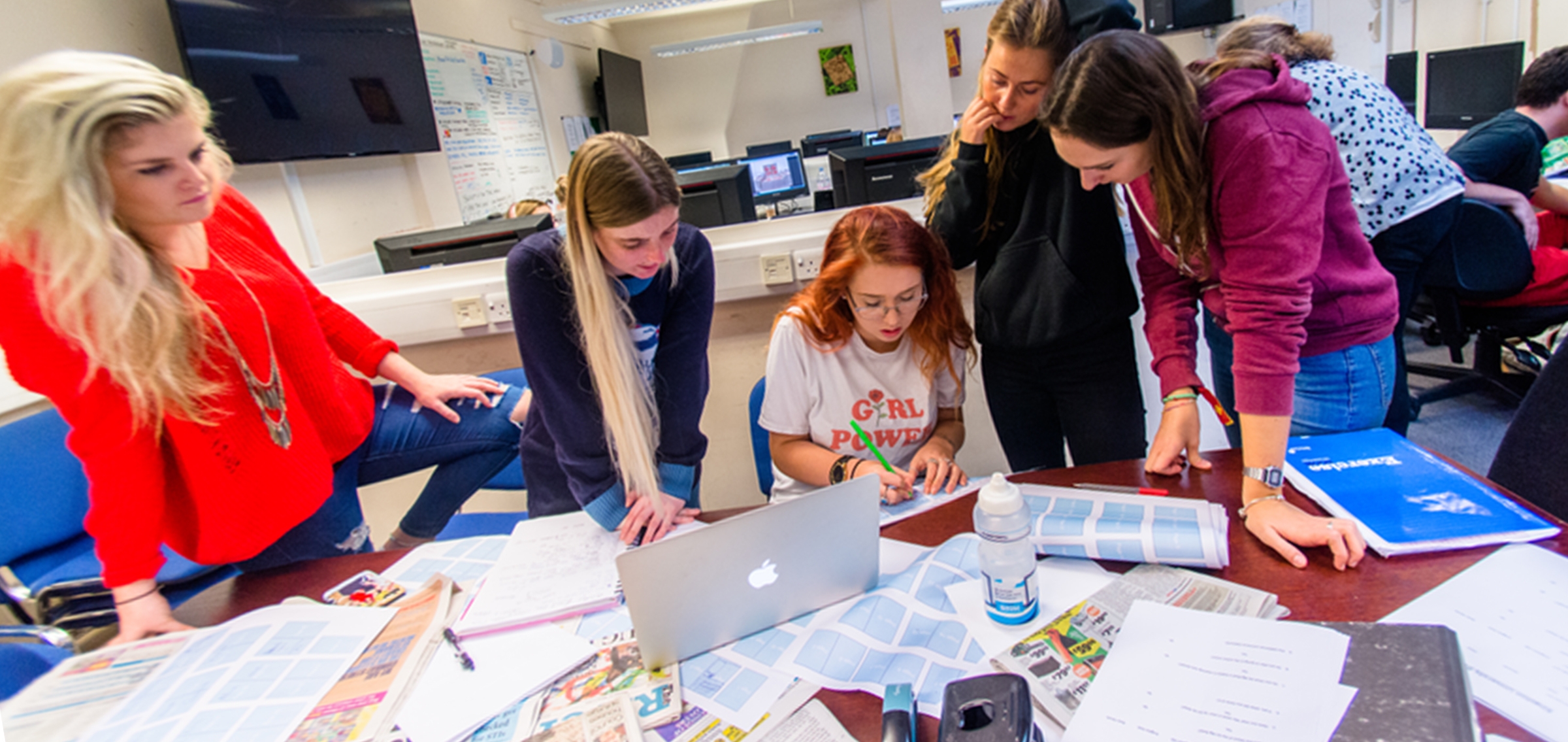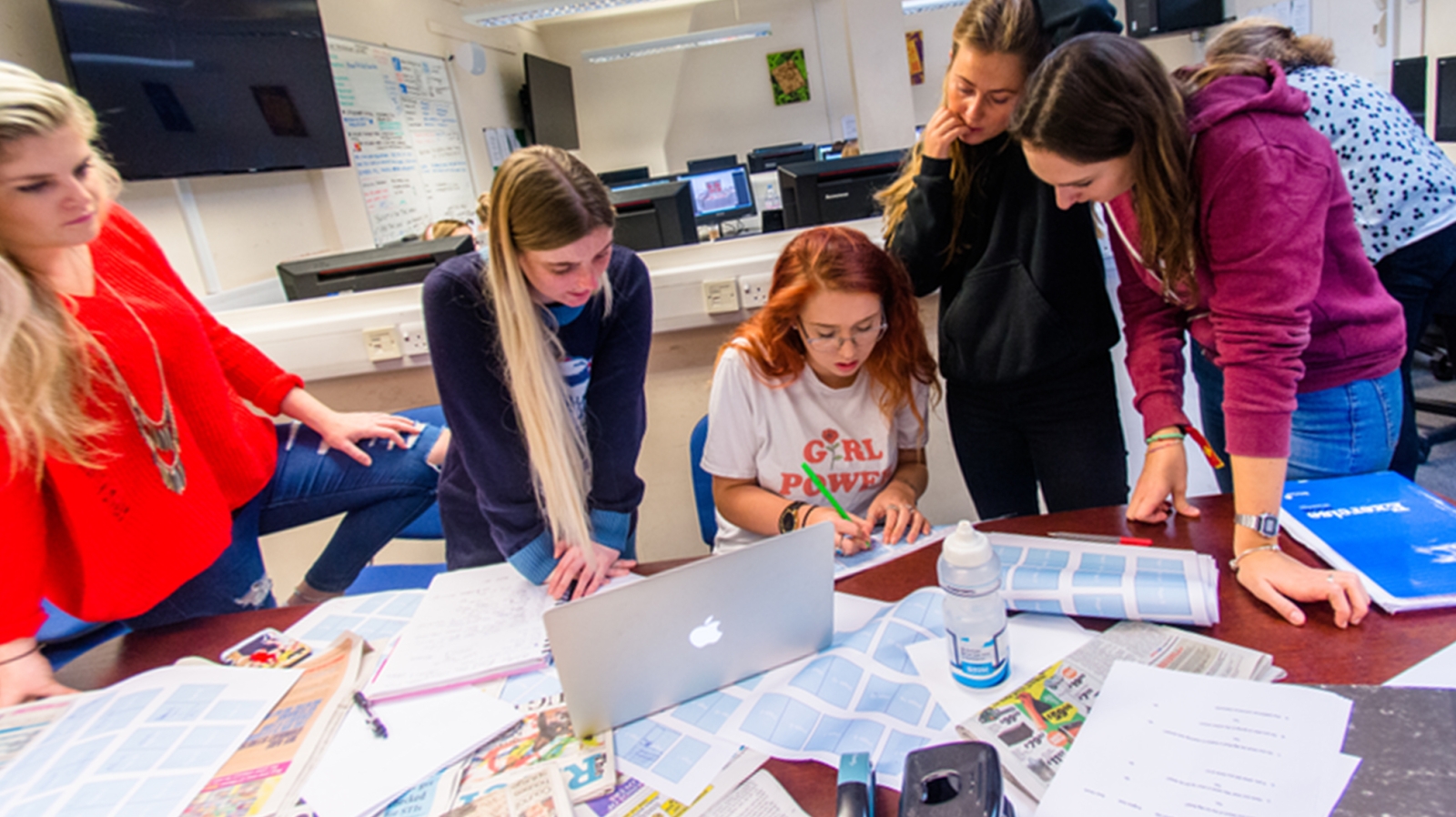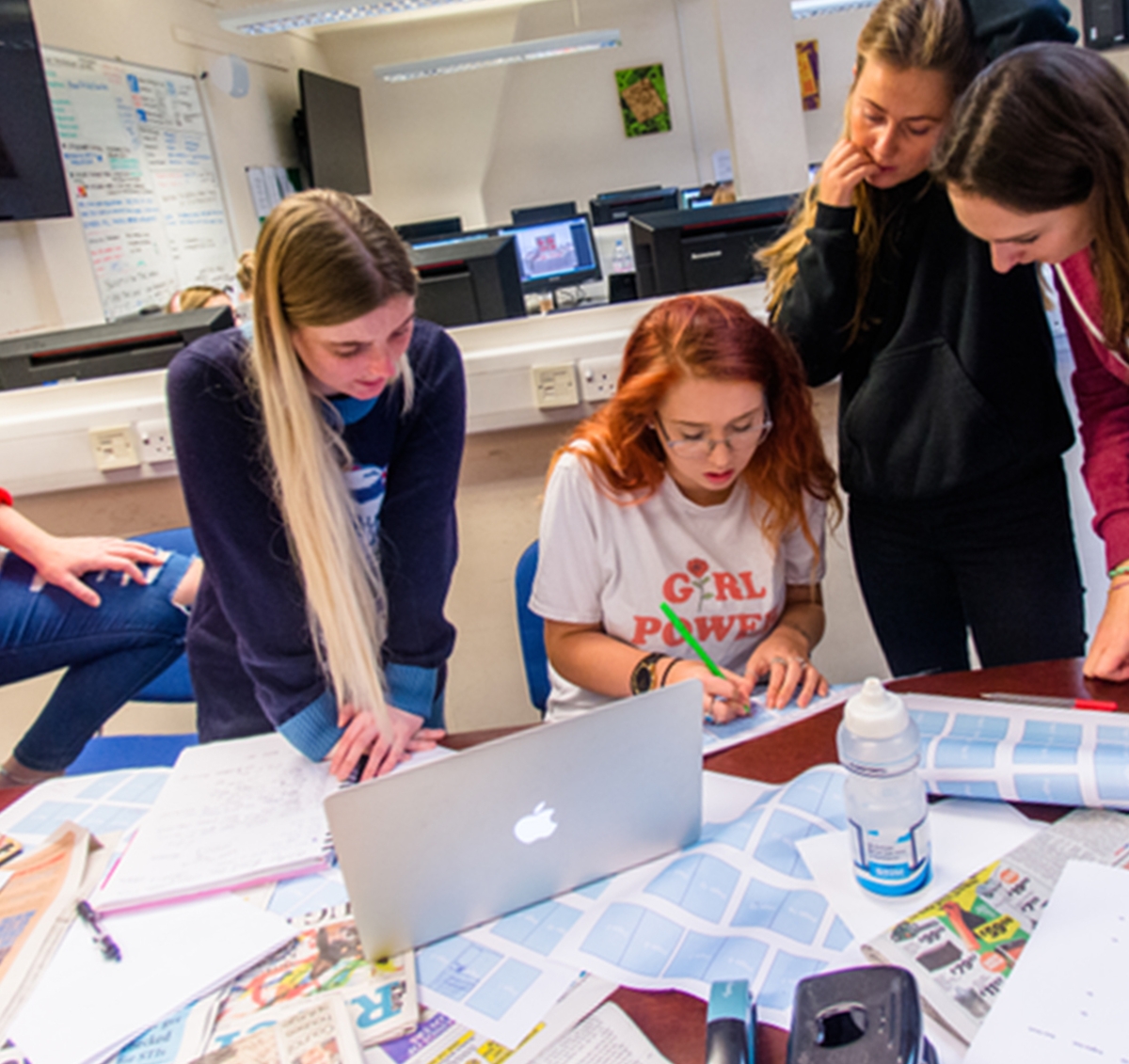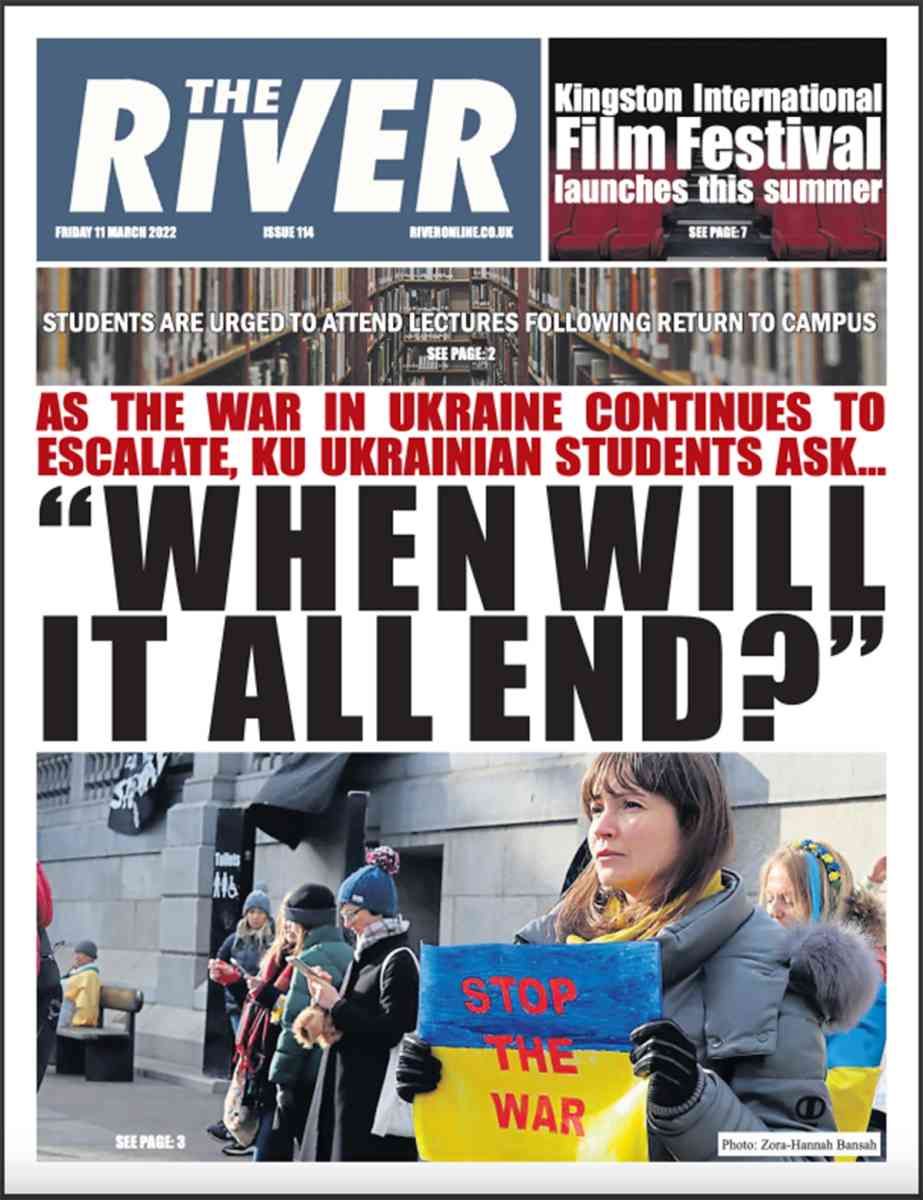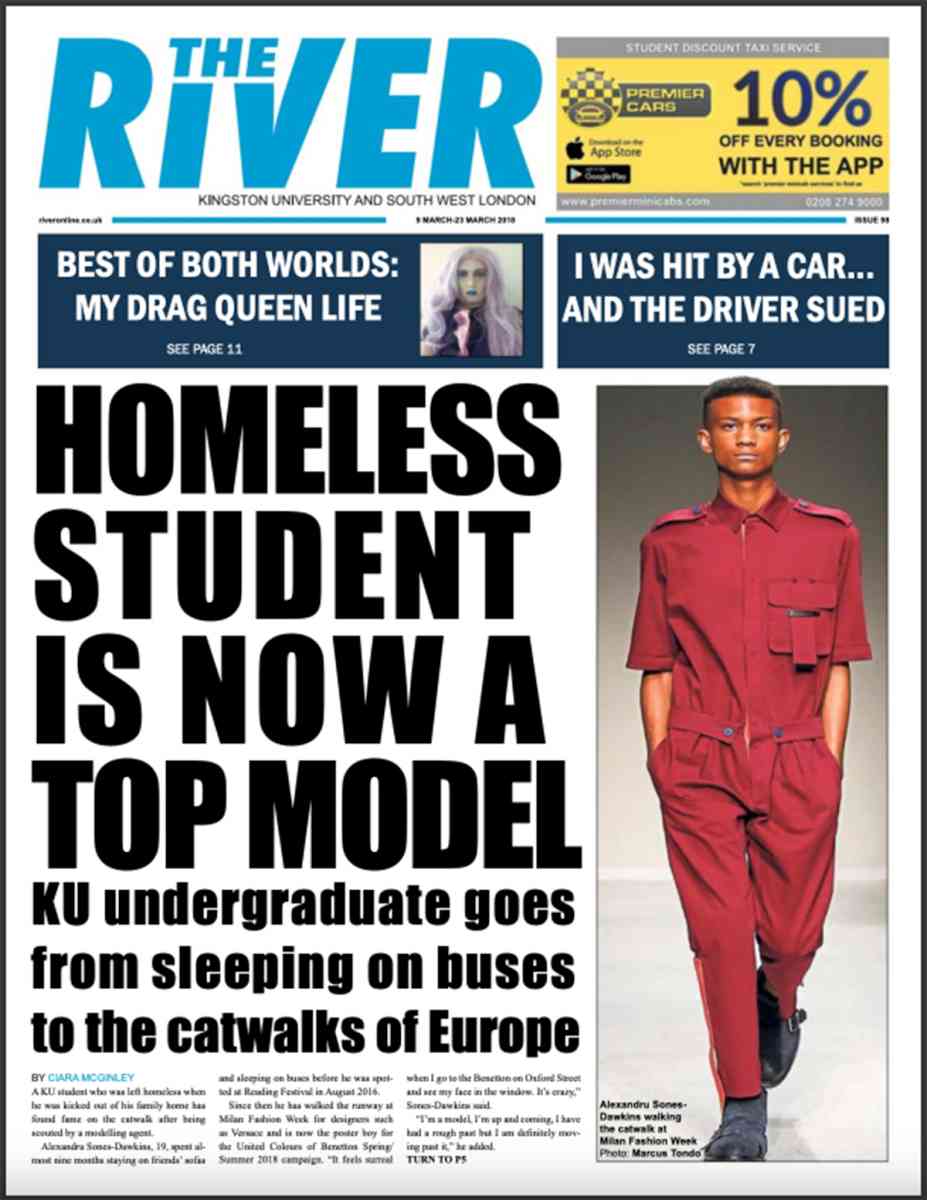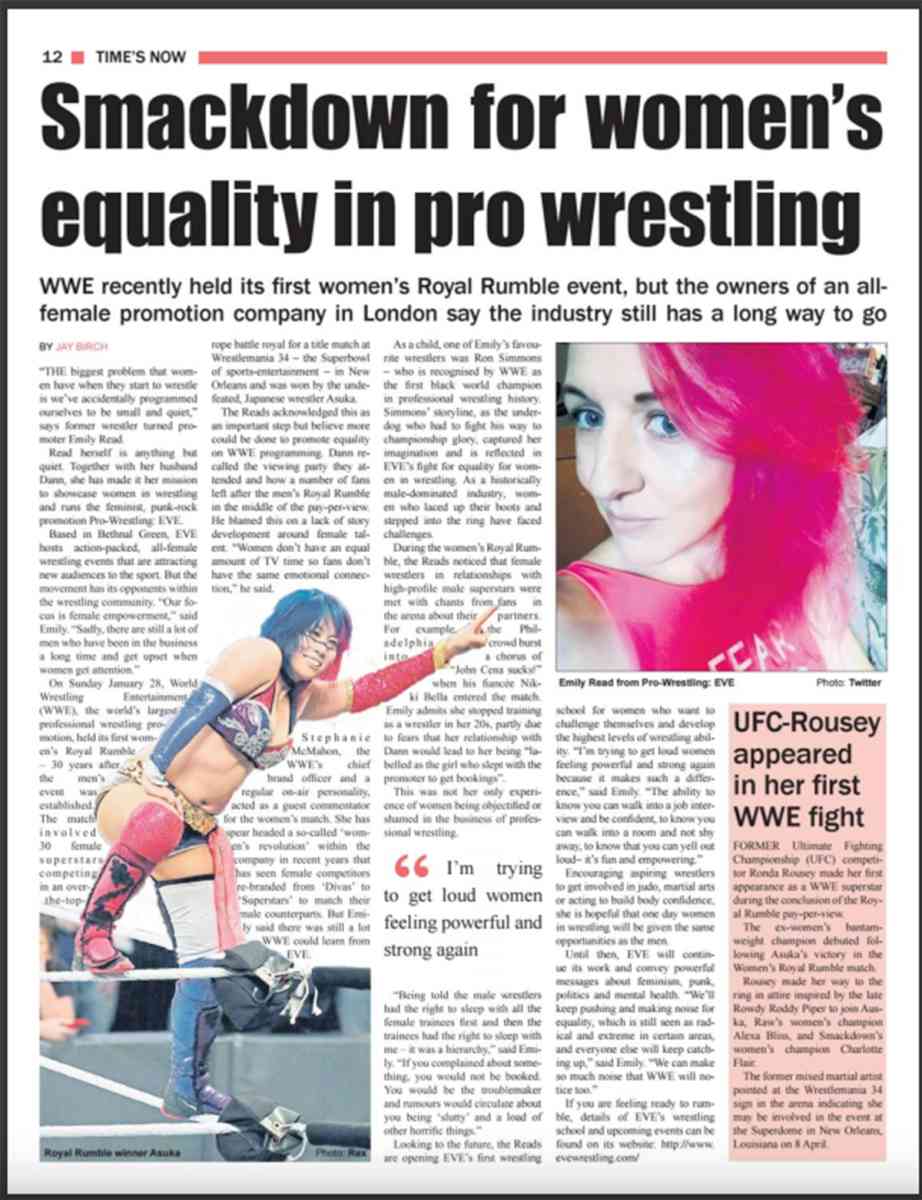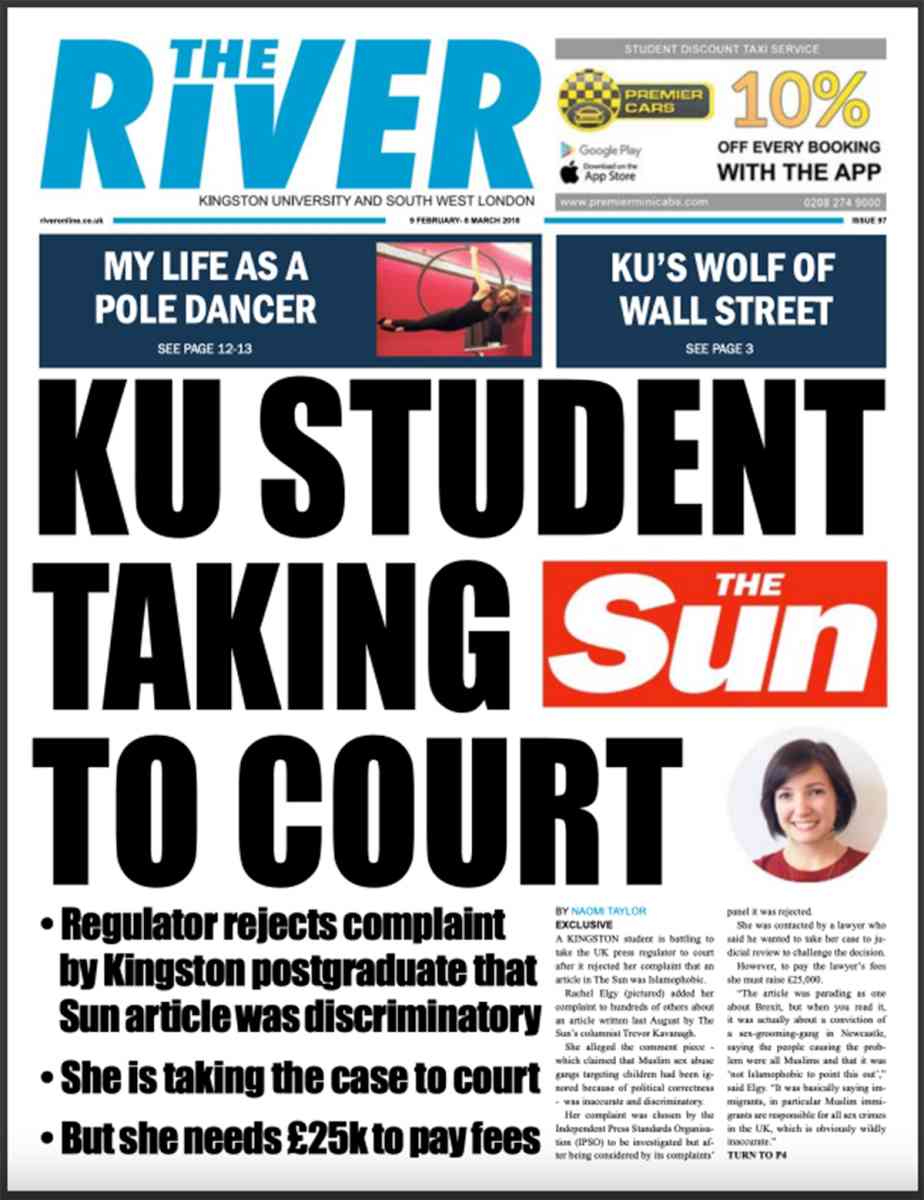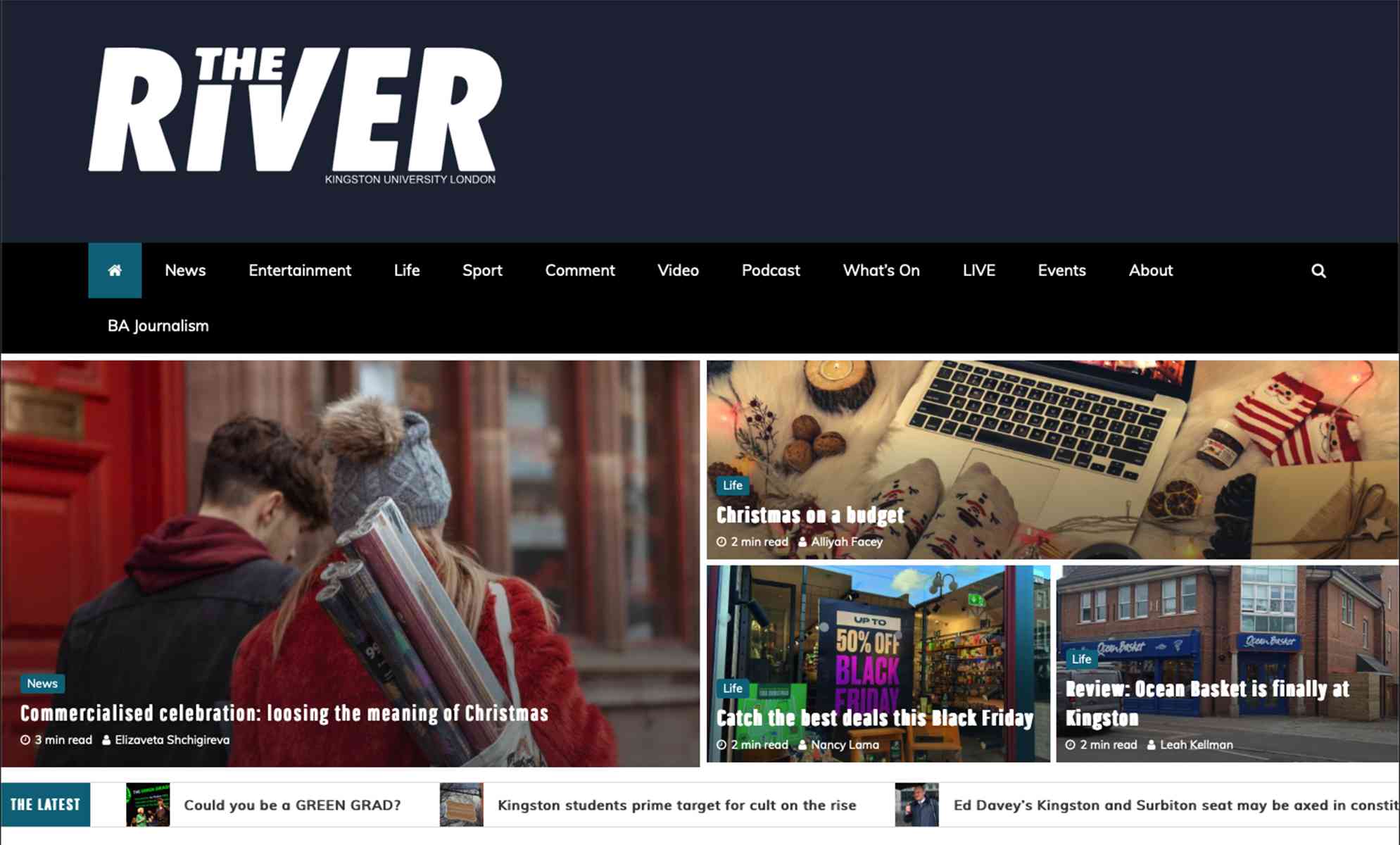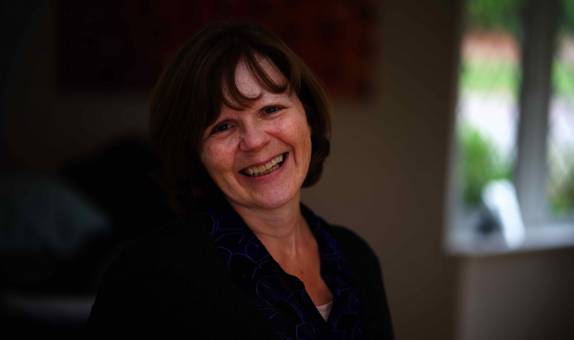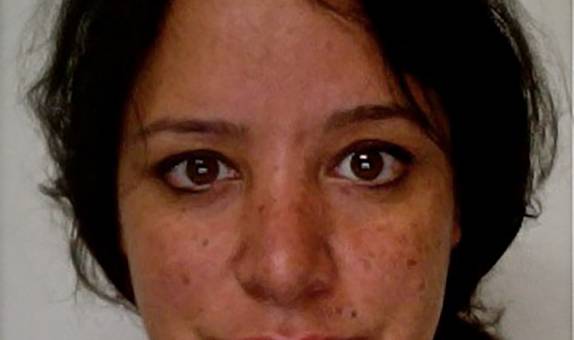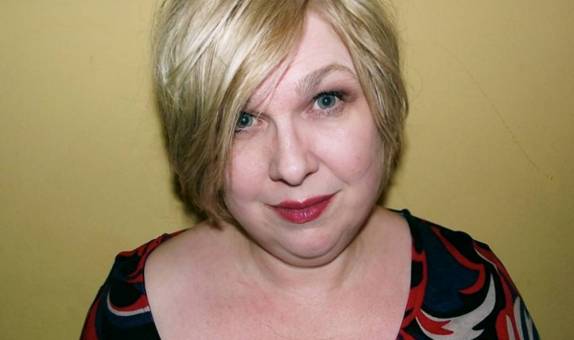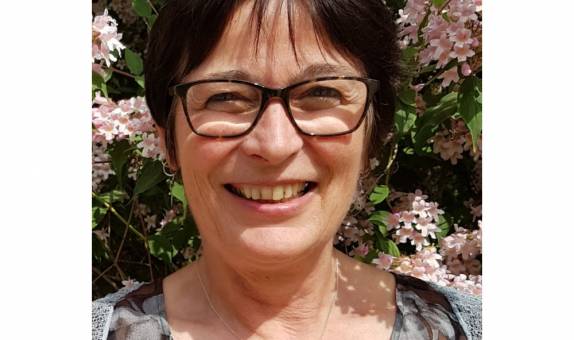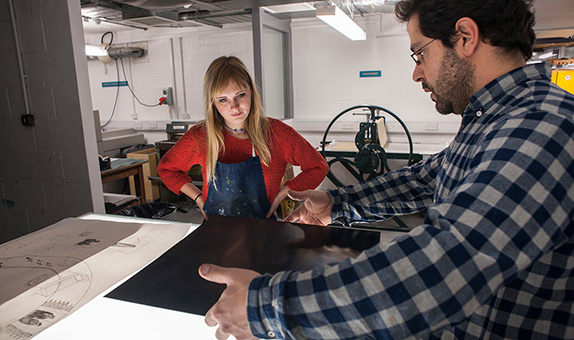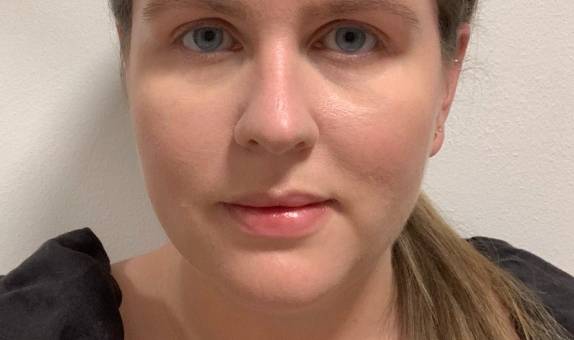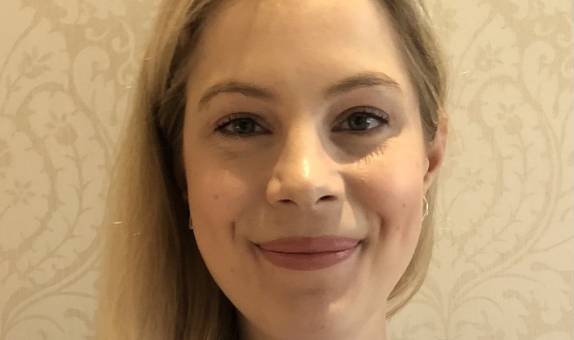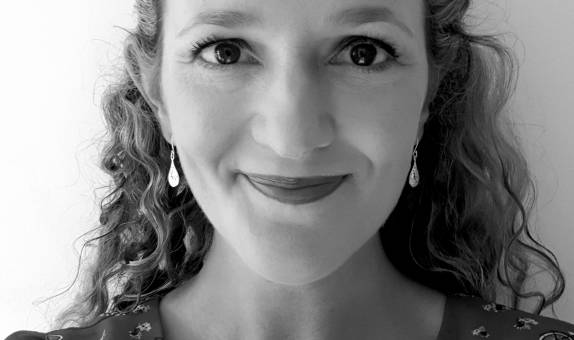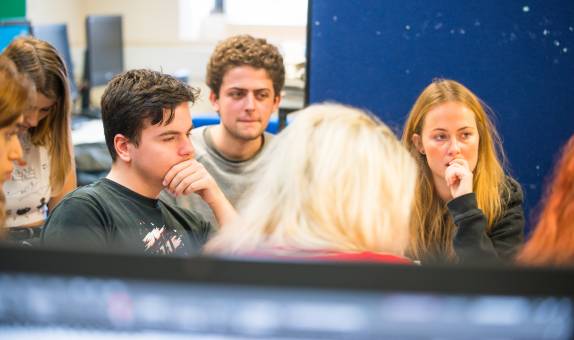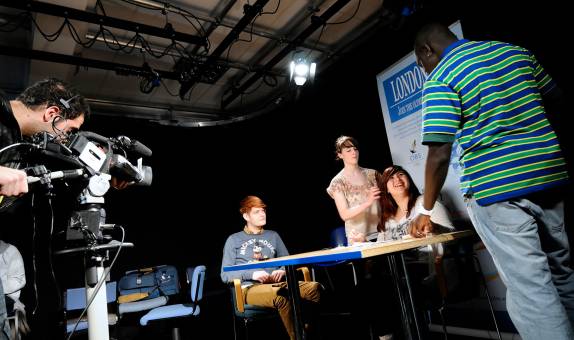Journalism BA (Hons)

Teaching Excellence Framework (TEF) Gold award
Our commitment to high quality teaching has been recognised with a TEF Gold rating. The University has received an overall rating of Gold, as well as securing a Gold award in the framework's two new student experience and student outcomes categories.
Why choose this course?
On this course, taught by experienced journalists, you'll research, write, edit and produce a range of journalism, gaining essential digital skills through live projects including our own award-winning River Newspaper and River Online.
You'll also choose from specialist options including broadcast, sport, fashion or visual journalism, as well as study media law and ethics. A focus on employment is at the heart of the course, making you industry-ready through our Future Skills programme and work experience.
Our graduates have gone on to work in top media companies including the BBC, Reuters, Sky, Channel Four, Hearst UK, Haymarket Media Group, EMAP, DMG Media and REACH.
Please follow us on X @kingstonjourno and Instagram @kingstonjourno to see some of the great work we and our graduates are doing.
| Attendance | UCAS code/apply | Year of entry |
|---|---|---|
| 3 years full time | P500 | 20242025 |
| 4 years full time including foundation year | P501 | 20242025 |
| 6 years part time | Apply direct to the University | 20242025 |
Please note: Teaching on this course may take place on more than one KU campus.
| Main location | Penrhyn Road |
Reasons to choose Kingston
- Be empowered to make a difference by learning to understand the democratic role of journalism in society, ensuring a diversity of stories are told.
- Build the knowledge and cutting-edge skills to be a professional journalist working as an agile, independent reporter working across multiple platforms.
- Gain hands-on experience in industry-standard practice facilities including a dedicated newsroom, radio and TV Studio, photography studios, digital video and audio editing suites.
- We are ranked in the Top 5 in London for Journalism (The Guardian University Guide 2024).
The Art School Experience
As part of Kingston School of Art, students on this course benefit from joining a creative community where collaborative working and critical practice are encouraged.
Our workshops and studios are open to all disciplines, enabling students and staff to work together, share ideas and explore multi-disciplinary making.

What our graduates say
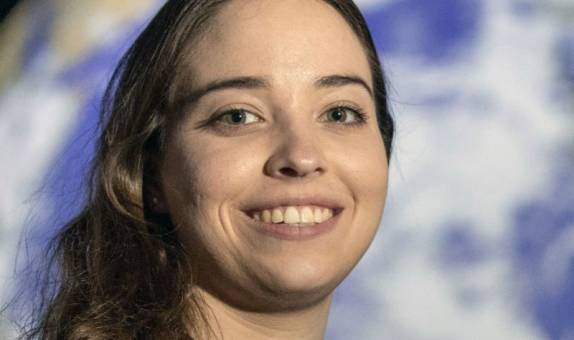
Steph Spyro, Environment Editor and Political Correspondent at the Daily Express

"My degree from Kingston University created the perfect springboard to launch into a successful journalism career. The expertise of the course's lecturers, and their insight into industry, were invaluable in laying a solid foundation. The buzz of working on the student newspaper, The River, perfectly resembled the excitement of a national newsroom.
"Instead of being daunted by the prospect of a life outside of university, I left KU feeling incredibly well prepared. I have KU's journalism course - and its dedicated lecturers - to thank for nurturing my enthusiasm and equipping me with the skills I need to thrive in the industry."

Ella Devereaux, Reporter at Nursing Times

"The journalism course at Kingston University laid all the foundations I needed to successfully kickstart my career as a news reporter. Throughout the course I was able to develop my journalistic flair through a variety of opportunities to experiment with print, digital and broadcast formats. Meanwhile the balance of academic and practical assessments allowed me to understand the history and ethics behind the profession, whilst having set time to chase down stories for The River newspaper.
"I can't thank my lecturers enough for their unwavering support and for always pushing me to be the best reporter I could be. By final year I knew I had the breadth of skills to bring into a newsroom, and I was lucky enough to secure a job at Nursing Times before I had finished the course."

Naomi Grant, Digital Assistant and Contributing Writer at Country & Town House

"I am the first in my family to have accomplished a degree and because of this I felt incredibly lost and unsure about how I would transition into the working world however Studying Journalism really equipped me with all necessary tools to do so. From working on the River newspaper to putting together my CV and later developing my own magazine, KU Journalism gave me an array of skills and experience, many of which could be used in a variety of jobs.
"In addition to this our lecturers where extremely supportive and made sure throughout that I was okay and understood exactly what needed to be done to attain my 2:1. Because of this I am extremely proud to say I am a KU Alumni. I am currently a Digital Assistant and contributing writer for Country & Town House, and quite literally living my dream."
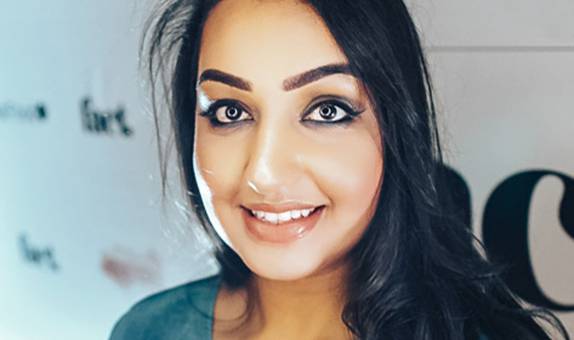
Shabana Adam, Editor-in-chief at FACT Magazine

"I can sincerely say that choosing to study Journalism at Kingston University is one of the best decisions I've ever made. You don't just learn the theory, but you are given great opportunities for practical, hands-on work to prepare you for a real-world position.
"The dedication and support received from the teaching staff went above and beyond; they are true mentors who always kept us motivated and in good spirits. I have since moved to the UAE to work as Editor-in-Chief for a regional lifestyle publication - a role in which I find myself putting all the skills and advice learned at KU into practice every day."
Student work
Our journalism students in action
Watch this time lapse video of Kingston University's student-run publication, The River, being produced.
What you will study
This programme is designed to equip you with knowledge and expertise, both to understand the world of journalism as consumers and to engage with it as practitioners.
You will also gain transferable skills that are of use in a variety of professions. These include the capacity to carry out independent research, and to demonstrate initiative and leadership; team building, interview techniques digital skills; and the ability to produce precise, accurate, engaging written work to tight deadlines.
Modules
Each level is made up of four modules each worth 30 credit points. Typically a student must complete 120 credits at each level.
Year 1
Year 2
Optional year
Final year
Year 1 introduces the skills for becoming an effective journalist including digital skills, mobile reporting, video and social media, news and feature writing. You will also study the broader context of journalism in society and the critical issues facing journalists today.
Core modules
Practical Journalism 1
30 credits
Writing is a key communication tool of journalism. This module introduces you to the language, practical conventions, contexts and functions of written journalism in the multimedia environment. Through studying and critically analysing the structure, style and content of articles published on websites, in newspapers and magazines you will begin to develop an understanding of how copy is gathered, put together and directed at specific readerships.
Through lectures and through practice in workshops you will learn to identify a story from raw, diffuse or incomplete information by the application of news values, to write it in appropriate style, to add headlines and online "furniture" and to upload it to a content management system.
Writing clear, accurate and engaging text relies on understanding and applying the rules of grammar, using the right words and constructing coherent prose. This module also helps you boost your grammar and punctuation skills, choose and use appropriate words and craft effective sentences and paragraphs. You will discover the underlying rules and principles, consider the impact of your writing decisions and develop your own writing and editing skills.
Also, by examining and practising skills needed to develop and write pieces such as: originating ideas, researching, assessing the reliability of sources, interviewing, organising material and adhering to house style, you will aim to produce journalistic news pieces and feature articles that are suitable for publication.
Thinking about Journalism
30 credits
This is a core module for full and half-field Journalism students. It offers a critical introduction to the discipline of journalism in all its forms, with particular emphasis on news. At its heart is a question central to studying journalism: why do journalists approach their trade in the way(s) they do, and what are the values, norms and assumptions underpinning their professional practice? The module commences with an examination of news values – the (often unspoken) 'rules of thumb' that determine the subjects/stories journalists report and the angles they pursue. It adopts a critical approach to examining reporting practice – introducing academic concepts like framing, agenda-setting and active audience theory to consider not only how journalists select and/or construct their narratives but also the increasing contribution of audiences themselves to the shaping of news discourse.
The module examines two other issues central to the role of the journalist: objectivity and public interest. Students are encouraged to critique the question of objectivity, with reference to real-world examples that both uphold and challenge this idea, including the practice of openly partisan/campaigning journalism. Public interest is examined in light of recent controversies that have exposed legal and ethical issues with contemporary journalism – including the 'phone-hacking' scandal and ensuing Leveson Inquiry and criminal prosecutions.
The module also acts as a more general introduction to the academic strand of the BA Journalism degree - introducing students to Kingston's personal tutor system and the conventions of essay-writing, Harvard referencing and exam technique.
Digital Skills for Journalists
30 credits
This two semester-long module introduces students to the background of the ‘online revolution' and its implications for the role of the journalist and the future of the industry. Through lectures and practical workshops students will gain understanding of the impact of the internet including social media on reporting and writing and an introduction to multimedia reporting including video. Assessment for this module takes the form of a portfolio (100%) of multimedia content including video, some of which is researched and created in students' own time.
Journalism in the Wider World
30 credits
A key part of a journalist's role is to inform readers what is going on in the world. To do this well, journalists have to understand how the world works and why. This module aims to build on existing understanding to provide students with the necessary political, economic, historical social and cultural context to underpin their development as journalists. Areas for exploration and discussion will include Britain's role in the world; the UK's relationship with Europe, the US and the developing world; British institutions and their role and influence (including the monarchy, parliament, the judiciary, Whitehall, religious bodies, universities, local government, banks and finance houses) and the history and emergence of competing ideologies such as capitalism, socialism and liberalism. The module will explore emerging social and cultural trends and the way these are covered in the media. Underpinning the module will be the key questions of "Where does power lie?" "Who has control?" "Who is responsible?" "Who really runs things?"
In Year 2, you will be able to develop your skills in a range of specialist modules including broadcast, and magazine journalism. In the Practical Journalism 2 module you will produce your own live digital and print publications. You will also study core subjects such as video, layout and media law and have the opportunity to pursue a research project. You can also choose to study abroad at one of our partner universities.
Core modules
Practical Journalism 2
30 credits
This is a core module taken by both all second year journalism students. It aims to expand, develop and hone the print and online skills acquired in Practical Journalism 1. The module will also explore how journalism is shaped by the legal and regulatory context in which it is practised. Students will focus on story development, writing and editing in print and online, layout and page design, and video story-telling. They will also learn Teeline shorthand, aiming to reach a speed of 60-100 wpm. They will acquire a working knowledge of libel, contempt and privacy law as well as court reporting skills.
Journalism in History and Literature
30 credits
This module aims to set the processes and outputs of UK journalism within their historical and literary context. You will develop an understanding of how journalism developed as a commercial activity and a recognisable profession in the nineteenth century and how these beginnings influenced the shape of journalism throughout the twentieth century, with the growth of the tabloid press, the battles of the press barons, the rise and fall of the power of the print unions and the growth of consumer and lifestyle journalism. You will discuss and debate key issues such as the growth of campaigning and investigative journalism and the freedom of the press in a democratic society.
You will be introduced to the journalism of writers such as Defoe, Swift, Steele, Dickens, as well as more modern literary journalists such as George Orwell. You will develop an understanding of how these writers helped shape the course of journalism. You will also have the opportunity to study two key texts in depth, chosen as examples of literary journalism, and examining them in their historical, cultural and theoretical contexts.
Optional modules
Journalism Research Paper
30 credits
This module offers students a chance to carry out an in-depth piece of research into an aspect of journalism which interests them and to work independently under the guidance of a tutor. Students will be able to choose their own topic, frame it in the way they want and select the most appropriate primary and secondary sources. Students can use their research not only to gain insight into a chosen topic but also to contact and question journalists working in the industry to find out what is really going on and to start networking. This module provides an excellent foundation for independent empirical research focused within the main course discipline. It will be especially relevant for students planning to do a dissertation or special study in their final year.
Magazine Journalism
30 credits
The UK magazine industry has never been more exciting and challenging. Despite digital and economic changes modern magazines devoted to trends and interests endure. This module looks at how these contemporary publications are positioned and how they co-operate to weave together strands of information. In this module you will learn about the contexts in which contemporary magazines operate. You will look at the current state of the periodicals sector and reflect on trends and developments by researching, originating and developing a magazine concept for a specified readership. You will build effective editorial, team-working skills and adapt these to the needs of differing audiences and objectives through the origination and production of your own magazine. You will apply journalistic skills to create a portfolio of articles and will use design and layout skills to produce a dummy magazine.
Broadcast Journalism
30 credits
This module will give students the hands-on editorial experience of news broadcasting using video and audio and provide them with the tools needed to deliver compelling stories. The course will be taught through weekly lectures and technical workshops. At the end of the module, students will have a digital portfolio containing a TV package and a radio report.
Students will be supported while they learn how to capture and record news using industry standard equipment. They will develop an ability to write for pictures and to craft sound. They will receive voice coaching and get the chance to read a radio bulletin and present pieces to camera. They will become confident in the language of the broadcast newsroom.
In an increasingly digital media environment broadcast news has had to adapt the way it produces content. These technological advances have also influenced the way people digest news coverage. Therefore, alongside learning traditional methods of broadcast journalism, students will be introduced to podcasts. They will learn what the digital world means for storytelling and what the video-enabled internet means for live reporting.
Although the world of conventional broadcasting is changing rapidly, good ideas will always hold creative currency. Students will be required to generate and pitch two original TV and radio ideas with particular audiences in mind.
You have the option to take an additional year to study abroad.
The final year enables you to put your learning into practice through hands-on experience at The River Newspaper and River Online – a past winner of the Guardian Student Media Award newspaper of the year. You will have the opportunity to undertake work experience and internships in London, the hub of the UK's media industry, supported by our work placement scheme.
You will study key subjects such as ethics and media law to prepare you for the workplace, and specialist modules such as sport, fashion, data or international journalism. You will expand your critical and analytical skills by undertaking a research paper on a specialist module or through a dissertation.
Core modules
Practical Journalism 3
30 credits
The module incorporates involvement in the production of the campus newspaper, The River, and its web-based version, River Online as well as undertaking a period of at least two weeks work experience within a media organisation working in a professional environment producing and practising journalism.
Each student will take on an editorial role on The River as well as contributing news and feature articles. Roles may vary, but will allow students to observe and participate in essential activities which contribute to producing real journalism. Teaching takes place in our dedicated newsroom, equipped with live news feeds, online content management system, and industry-standard software packages including Adobe InDesign and Photoshop.
The placement will typically be for two weeks, although students who show initiative in negotiating more substantial work experience may be allowed to extend this period.
Journalism, Ethics and the Industry
30 credits
This module aims to build on students' critical understanding of the function of journalism, its place in society and its ethical, legal, technological and commercial framework. It develops material on the nature, history and purpose of journalism covered in earlier modules to critically examine how the UK media has risen to the challenge of reflecting and representing the ever more socially and culturally diverse Britain of today – as well as its duty to accurately and impartially report on foreign affairs and conflicts.
By considering concepts such as truth, objectivity, accountability, a free press, freedom of information and public interest in relation to journalism, students will develop an awareness of the tensions between journalists, readers, sources and proprietors in a changing media landscape and what it means to be an ethically responsible journalist.
Students will also examine the impact of social, technological and commercial changes on the practice and business of journalism, including the decline of conventional advertising, the increasing plurality of media forms, changing audience demands and expectations, and the rise of news aggregating websites and cheap ‘content' over costly original reporting.
Journalism Independent Project
30 credits
This module gives final year students the opportunity to work on a major piece of independent work, which consolidates and further develops the skills and knowledge they have acquired through prior learning, in an area of journalistic practice or dissertation research. Work carried out in each of these areas will lead to real and specific outputs. Practical projects could include, for example: a video documentary; a portfolio of long-form journalism; a podcast series; or a new media product such as a magazine or website. Students undertaking a practical project will situate and critique their journalistic work with reference to academic debates and concepts. Their practical output will be accompanied by a 3,000-word critical rationale setting out the background to the project as well as its significance, novelty and objectives.
Students will agree the scope and aims of their project through discussion and agreement with an individual project supervisor. They will then write a proposal. Students will be expected to work independently, under supervision, to demonstrate effective self-management and decision-making when operating autonomously in the planning and execution of their dissertation or practical project. Students will be supported in the production of their practical outputs by our academic subject specialists and dedicated media and broadcast technicians.
Journalism Specialism
30 credits
This highly practical module allows students to explore in depth and actively engage with a range of journalism specialisms which could include: Sports Journalism, Fashion Journalism, Investigative Data Journalism, Creative Non-fiction, Foreign Correspondence, Environmental Journalism, Business Journalism, Arts and Entertainment Journalism, Health and Science Journalism or Political Journalism.
Students will further develop their researching, writing, reporting and digital skills acquired through prior learning to produce professional copy and other outputs pertinent to each specialism such as: social media, video, data visualisations, etc. They will apply their newly-gained specialist knowledge using their acquired skills to the production of a portfolio of cutting-edge specialist journalism.
The practices of each area of specialist journalism will be placed in a context throughout the module. Through a series of lectures and in-class discussions students will gain insight into each specialism and how it works. They will acquire an appreciation of the historical, cultural, global and economic issues which specialist journalists must understand. The module prepares students to pursue jobs within specialist beats upon graduation.
Please note
Optional modules only run if there is enough demand. If we have an insufficient number of students interested in an optional module, that module will not be offered for this course.
Foundation year
You can also study this course with a Foundation year.
Future Skills
Knowledge to give you the edge
Embedded within every course curriculum and throughout the whole Kingston experience, Future Skills will play a role in shaping you to become a future-proof graduate, providing you with the skills most valued by employers such as problem-solving, digital competency, and adaptability.
As you progress through your degree, you'll learn to navigate, explore and apply these graduate skills, learning to demonstrate and articulate to employers how future skills give you the edge.
At Kingston University, we're not just keeping up with change, we're creating it.

Entry requirements
Teaching and assessment
Scheduled learning and teaching on this course includes timetabled activities including lectures, seminars and small group tutorials.
It may also include critiques, project work, studio practice and performance, digital labs, workshops, and placements.
Who teaches this course?
Many of the Journalism teaching team are published writers, reporters, international correspondents and editors, with extensive experience and professional links: they will help you to develop your skills, networks and gain access to industry contacts. Their expertise and knowledge is closely matched to the content of the modules on this course.
You will also benefit from weekly guest lectures. In the past year guest lecturers have included senior journalists and editors at The Guardian, Glamour, The Sunday Times, VICE, Vogue, New Statesman and CNN.
Fees and funding
Additional costs
Depending on the programme of study, there may be extra costs that are not covered by tuition fees which students will need to consider when planning their studies. Tuition fees cover the cost of your teaching, assessment and operating University facilities such as the library, access to shared IT equipment and other support services. Accommodation and living costs are not included in our fees.
Where a course has additional expenses, we make every effort to highlight them. These may include optional field trips, materials (e.g. art, design, engineering), security checks such as DBS, uniforms, specialist clothing or professional memberships.
After you graduate
Graduates work at many large media organisations such as Reuters, Cosmopolitan, OK!, Channel 4 News, Sky, the BBC, The Times and Al Jazeera. Examples of first job student destinations after graduation include journalist, picture editor/researcher, sub-editor and junior feature writer.
Examples of recent first jobs after graduation include:
- Journalist, Express Newspapers
- Picture editor/researcher, The Sun, News UK
- Sub-editor, MailOnline (Snapchat Discover desk)
- Junior feature writer, Harvey Nichols
- Junior fashion writer, SecretSales.com
- Multimedia reporter, Pink News
- Reporter, Copenhagen Times
- Reporter, EuroMoney Institutional Investor
- Trainee reporter, South West News Service
- Video journalist, RT UK
- Editorial assistant, HMG Aerospace
- Copywriter, Health & Care
Course combinations
You can combine a foundation year with the following subjects:
- Journalism with Foundation Year – UCAS code: P501
- Journalism and Media – UCAS code: PP53
The courses are 4 years full time, including foundation year.
Key information set
The scrolling banner(s) below display some key factual data about this course (including different course combinations or delivery modes of this course where relevant).
Course changes and regulations
The information on this page reflects the currently intended course structure and module details. To improve your student experience and the quality of your degree, we may review and change the material information of this course. Course changes explained.
Programme Specifications for the course are published ahead of each academic year.
Regulations governing this course can be found on our website.
